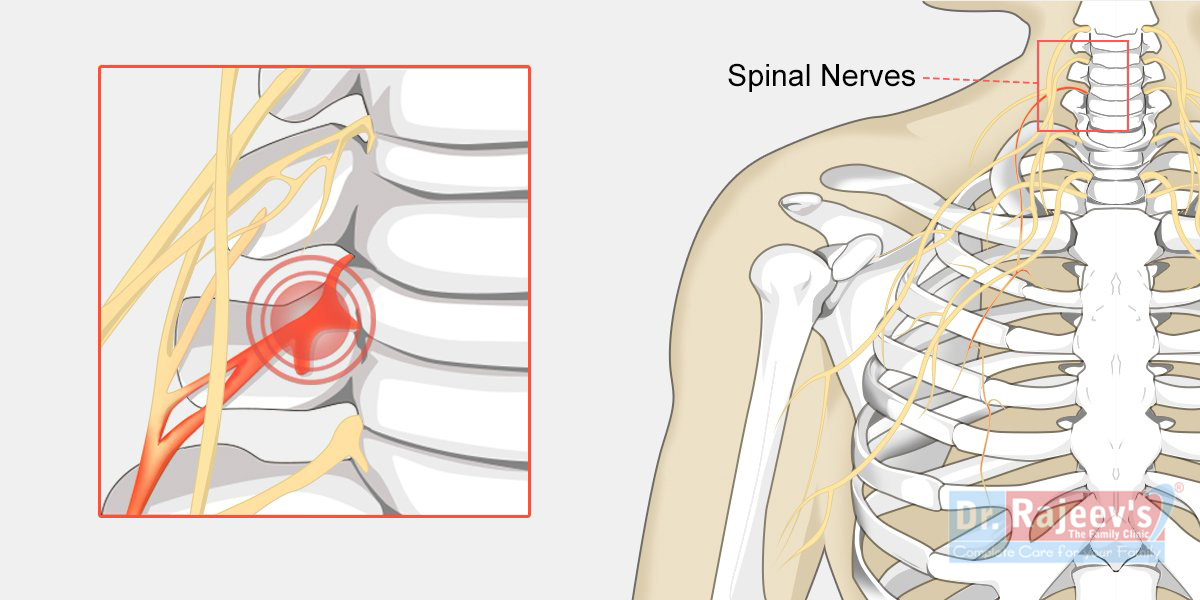Spinal nerve compression occurs when a nerve in the spine is pressed or pinched, leading to a range of symptoms depending on the location and severity of the compression. This condition can affect any part of the spine, including the cervical (neck), thoracic (mid-back), or lumbar (lower back) regions.
Causes of Spinal Nerve Compression:
-
Herniated Disc: When the gel-like center (nucleus pulposus) of an intervertebral disc bulges or herniates through a tear in the outer layer (annulus fibrosus), it can press on nearby spinal nerves.
-
Degenerative Disc Disease: As discs age, they lose hydration and elasticity, leading to reduced disc height and potential nerve compression.
-
Spinal Stenosis: Narrowing of the spinal canal or foramina (the spaces where nerves exit the spinal column) due to degenerative changes or congenital factors can compress spinal nerves.
-
Bone Spurs: Osteophytes, or bony growths that form as a result of arthritis or degenerative changes, can impinge on nerves.
-
Spondylolisthesis: A condition where one vertebra slips forward over the one below it, potentially compressing nerves.
-
Spinal Tumors: Benign or malignant tumors can grow and exert pressure on spinal nerves.
-
Infections or Inflammatory Conditions: Conditions such as abscesses or inflammatory diseases like rheumatoid arthritis can lead to nerve compression.
Symptoms of Spinal Nerve Compression:
- Pain: Sharp, radiating pain that follows the path of the compressed nerve, often felt in the back, neck, or limbs.
- Numbness: Loss of sensation or tingling in the areas served by the affected nerve.
- Weakness: Muscle weakness in the limbs or trunk.
- Reflex Changes: Altered or diminished reflexes in the affected area.
- Burning Sensation: A burning feeling along the nerve pathway.
- Loss of Coordination: Difficulty with balance or coordination if the spinal cord is involved.
Diagnosis:
-
Medical History and Physical Examination:
- Symptoms Review: Discussion of the nature, location, and duration of symptoms.
- Physical Exam: Assessing strength, sensation, reflexes, and range of motion.
-
Imaging Tests:
- MRI (Magnetic Resonance Imaging): Provides detailed images of soft tissues, including discs, nerves, and the spinal cord, to identify compression sources.
- CT Scan: Offers detailed cross-sectional images of the spine and can be used to identify bone spurs or other structural abnormalities.
- X-rays: Can help detect bone abnormalities, disc space narrowing, or alignment issues but are less effective for visualizing soft tissue.
-
Electromyography (EMG) and Nerve Conduction Studies:
- EMG: Measures the electrical activity of muscles to determine if nerve compression is affecting muscle function.
- Nerve Conduction Studies: Assess the speed and strength of electrical signals traveling along nerves.
Treatment Options:
-
Conservative Management:
- Medications:
- Pain Relievers: Over-the-counter pain medications like acetaminophen or NSAIDs (ibuprofen) to manage pain.
- Muscle Relaxants: To reduce muscle spasms.
- Corticosteroids: Oral or injected steroids to reduce inflammation and swelling.
- Physical Therapy:
- Exercise: Strengthening and stretching exercises to improve flexibility, strengthen supporting muscles, and relieve pressure on nerves.
- Posture Training: Techniques to improve posture and spinal alignment.
- Lifestyle Modifications:
- Activity Modification: Avoiding activities that exacerbate symptoms and incorporating ergonomic adjustments to daily activities.
-
Interventional Procedures:
- Epidural Steroid Injections: Injecting corticosteroids into the epidural space around the spinal nerves to reduce inflammation and pain.
- Nerve Blocks: Local anesthetic injections to provide temporary relief from nerve pain.
-
Surgical Treatment:
- Discectomy: Removal of a herniated disc or portion of a disc that is pressing on a nerve.
- Laminectomy: Removal of part of a vertebra (lamina) to relieve pressure on the spinal cord or nerves.
- Foraminotomy: Enlarging the foramina to alleviate nerve compression.
- Spinal Fusion: Joining two or more vertebrae together to stabilize the spine and reduce nerve compression.
When to Seek Medical Attention:
- Persistent Symptoms: Symptoms that do not improve with conservative treatment or worsen over time.
- Severe Pain: Intense pain that affects daily activities or is not relieved by medication.
- Neurological Symptoms: New or worsening symptoms such as significant weakness, loss of sensation, or difficulty with coordination.
- Bowel or Bladder Dysfunction: Incontinence or difficulty with bowel movements, which may indicate severe nerve compression or involvement of the spinal cord.
Early evaluation and treatment are important to manage symptoms effectively and prevent long-term damage. If you experience symptoms suggestive of spinal nerve compression, consulting with a healthcare provider like Dr. Rajeev Kumar can help determine the appropriate diagnostic and treatment approach.
HOMOEOPATHIC TREATMENT FOR SPINAL CORD COMPRESSION
Cimicifuga : Very useful medicine for spinal compression with stiffness & pain in neck
Nux vomica : Useful medicine for those person who have sedentary life, suffers with constipation, uses alcoho.There is burning in spine,very useful when person feel difficult in turning.
Lachnantes :Useful for nerve compression with severe muscle spasm and numbness.
Calc.carb : Very useful in nerve compression when there is rigidity & stiffness in morning,very useful when patient is unable to turn and there is tendency to strain easily.
Rhus.tox :Useful for nerve compression when there is pain from false position<sitting, exertion> warmth application.e.t.c


